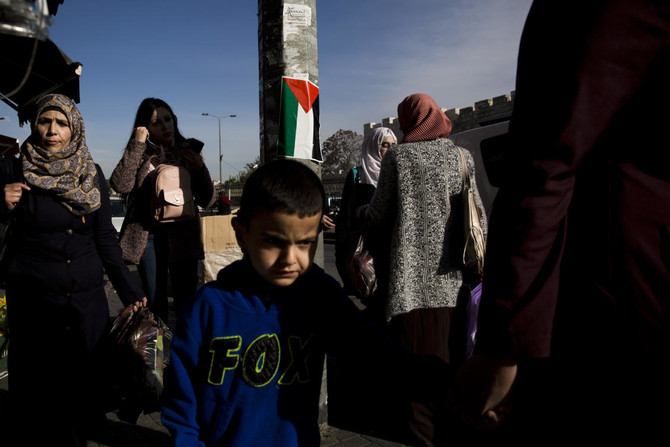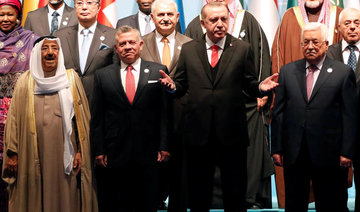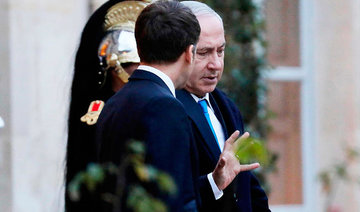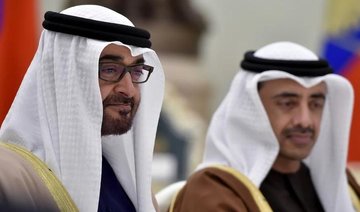JERUSALEM: Pedestrians walk on a thick layer of soot from tires set ablaze in frequent clashes with Israeli troops. Cars navigate around potholes in streets littered with garbage. Motorists honk in a traffic jam near an Israeli checkpoint that is framed by the towering cement slabs of Israel’s separation barrier.
It’s morning rush hour in Ras Khamis, a neglected, restive Arab neighborhood of Jerusalem where President Donald Trump’s recent recognition of the contested city as Israel’s capital has been met by cynicism, defiance and new fears that Palestinians will increasingly be marginalized.
Trump’s pivot on Jerusalem “is regrettable, saddening and unfair,” said Yasser Khatib, 42, who runs a supermarket across the street from the barrier that separates several Arab neighborhoods of Jerusalem from the rest of the city.
Khatib said he has strong religious ties to the city and that his family’s roots go back generations. “We have no life without Jerusalem,” he said as he sold snacks to school children. “Trump can say whatever he wants.”
Palestinians make up 37 percent of Jerusalem’s population of 866,000, up from 26 percent in 1967 when Israel captured east Jerusalem, expanded the city’s boundaries into the West Bank and annexed the enlarged municipal area to its capital.
The international community says east Jerusalem is occupied territory and that the city’s fate must be determined in negotiations with the Palestinians who seek a capital in the eastern sector.
Trump couched his Jerusalem comments — viewed in the Arab world as a show of pro-Israel bias — by saying he is not taking a position on the boundaries of Israeli sovereignty in the city.
Yet he made no specific mention of the city’s large Palestinian population, which could reach 44 percent by 2040, according to the Jerusalem Institute for Policy Research think tank.
Despite Israel’s portrayal of Jerusalem as united, there are stark differences between Arab and Jewish areas after what critics say is half a century of neglect and discrimination.
“On the ground, Israel is not investing much in developing the Arab neighborhoods of Jerusalem,” said Yitzhak Reiter, in charge of the Jerusalem Institute’s mapping of the physical and social infrastructure of Arab neighborhoods.
In many spheres, “the city is still divided, with two different transport systems, two different policies on building and construction.”
Israel would have to invest billions of dollars in Arab areas to reach parity with Jewish neighborhoods, he said.
For now, 79 percent of Arab residents fall below the poverty line, compared to 27 percent of Jews, according to Jerusalem Institute figures.
Welfare services maintain four offices in the Arab east, compared to 19 offices in Jewish areas, said the Association for Civil Rights in Israel. Arab schools have a shortage of hundreds of classrooms, ACRI said. The west has 34 post offices, compared to nine in the east.
Mayor Nir Barkat’s office said he developed a plan “unprecedented in scope and budget allocation to reduce gaps in east Jerusalem” and made progress in alleviating “50 years of neglect” inherited from predecessors. Among other things, the city opened more than 800 classrooms in Arab schools, with 1,000 more in the pipeline, the statement said.
ACRI said the added classrooms included many spaces rented in existing residential buildings.
Jerusalem is the largest mixed city in the Holy Land, and Arabs and Jews interact in daily life, including in malls and hospitals. Many Palestinians work in shops and restaurants in west Jerusalem, typically earning more there than on the east side.
Yet east-west infrastructure gaps remain wide.
Israel may be unwilling to invest heavily in areas that could one day come under Palestinian rule, said Reiter, adding that efforts to maintain a strong Jewish majority may also play a role.
Palestinians claim Israel is trying to drive Arabs out of Jerusalem.
Ziad Hammouri, a community organizer, said Trump’s new position on Jerusalem boosts Israel’s attempts to “control east Jerusalem and to exclude Palestinians from Jerusalem.”
One plan floated by a Cabinet minister — and opposed by Barkat — would place tens of thousands of Palestinians who live inside the municipal boundaries but beyond the separation barrier under a new Israeli-run municipality, thus sharply reducing the number of Palestinians counted as Jerusalemites.
These areas, including Ras Khamis, have seen apartment towers rise in recent years as Israel stopped enforcing building restrictions there.
East Jerusalemites desperate for housing moved there in large numbers, despite fears that they would eventually be “zoned out” of Jerusalem.
On the “Jerusalem side” of the barrier, it’s difficult for Palestinians to obtain building permits, because of lack of outline plans or discriminatory zoning, said Israeli rights groups. Many Palestinians built without permits, and 88 homes were demolished in 2016, the most in a decade, ACRI said.
Barkat’s office said a low share of permit application come from Arab neighborhoods, and that a high percentage of those are approved.
Since 1967, Israel has built large neighborhoods for Jews in the annexed east, now home to 212,000 Israelis.
Palestinian Ismail Siam said a one-story home he built on his land for two adult children was demolished by Israel twice in 14 months, on grounds that he did not have a building permit.
“They want to expel us from the city,” said Siam, 54, standing near patches of floor tiles left from the demolished house.
The plot faces large construction sites for Jewish neighborhoods across a ravine.
Most Palestinians in Jerusalem have residency status.
After 1967, most Palestinians didn’t consider the more secure citizenship option, which would have meant recognizing Israeli rule. In recent years, growing numbers have applied, but increasingly encountered bureaucratic hurdles.
Prolonged absence can put Palestinian residents at risk of expulsion; close to 15,000 have been stripped of residency rights since 1967.
Palestinians in the city can vote in local elections, but have largely refrained from doing so, to avoid the perception that they accept Israeli rule.
East Jerusalem residents also feel increasingly abandoned by Palestinian President Mahmoud Abbas’s West Bank self-rule government. Israel clamps down on Palestinian Authority activities in Jerusalem, limiting Abbas’ influence in the city.
The leadership vacuum was briefly filled over the summer when Muslim clerics led a successful grassroots campaign against metal detectors Israel had installed at east Jerusalem’s Al-Aqsa Mosque compound. Islam’s third-holiest shrine, built on the remnants of Judaism’s holiest site, is a frequent flashpoint of violence.
After Trump’s decision, city residents mounted only small protests, compared to larger marches in the West Bank and elsewhere.
Activist Yara Hawari said rallying large crowds is difficult when there is no narrow objective, such as removing the metal detectors.
“What we are asking is simple, an end to colonization,” she said. “But it’s not as tangible.”
Palestinians, a large Jerusalem minority, feel Trump snub
Palestinians, a large Jerusalem minority, feel Trump snub

UN chief condemns ‘escalation’ between Yemen’s Houthis and Israel

NEW YORK: The UN chief on Thursday denounced the “escalation” in hostilities between Yemen’s Houthi rebels and Israel, terming strikes on the Sanaa airport “especially alarming.”
“The Secretary-General condemns the escalation between Yemen and Israel. Israeli airstrikes today on Sana’a International Airport, the Red Sea ports and power stations in Yemen are especially alarming,” said a spokesperson for UN Secretary-General Antonio Guterres in a statement.
Israeli air strikes pummelled Sanaa’s international airport and other targets in Yemen on Thursday, with Houthi rebel media reporting six deaths.
The attack came a day after the Houthis fired a missile and two drones at Israel.
World Health Organization chief Tedros Adhanom Ghebreyesus said on social media he was at the airport during the strike, with the UN saying that a member of its air crew was injured.
The United Nations put the death toll from the airport strikes at three, with “dozens more injured.”
UN chief Guterres expressed particular alarm at the threat that bombing transportation infrastructure posed to humanitarian aid operations in Yemen, where 80 percent of the population is dependent on aid.
“The Secretary-General remains deeply concerned about the risk of further escalation in the region and reiterates his call for all parties concerned to cease all military actions and exercise utmost restraint,” he said.
“He also warns that airstrikes on Red Sea ports and Sana’a airport pose grave risks to humanitarian operations at a time when millions of people are in need of life-saving assistance.”
The UN chief condemned the Houthi rebels for “a year of escalatory actions... in the Red Sea and the region that threaten civilians, regional stability and freedom of maritime navigation.”
The Houthis are part of Iran’s “axis of resistance” alliance against Israel.
Bodies of about 100 Kurdish women, children found in Iraq mass grave

TAL AL-SHAIKHIA, Iraq: Iraqi authorities are working to exhume the remains of around 100 Kurdish women and children thought to have been killed in the 1980s under former Iraqi ruler Saddam Hussein, three officials said.
The grave was discovered in Tal Al-Shaikhia in the Muthanna province in southern Iraq, about 15-20 kilometers (10-12 miles) from the main road there, an AFP journalist said.
Specialized teams began exhuming the grave earlier this month after it was initially discovered in 2019, said Diaa Karim, the head of the Iraqi authority for mass graves, adding that it is the second such grave to be uncovered at the site.
“After removing the first layer of soil and the remains appearing clearly, it was discovered that they all belonged to women and children dressed in Kurdish springtime clothes,” Karim told AFP on Wednesday.
He added that they likely came from Kalar in the northern Sulaimaniyah province, part of what is now Iraq’s autonomous Kurdistan region, estimating that there were “no less than 100” people buried in the grave.
Efforts to exhume all the bodies are ongoing, he said, adding that the numbers could change.
Following Iraq’s deadly war with Iran in the 1980s, Saddam’s government carried out the ruthless “Anfal Operation” between 1987 and 1988 in which it is thought to have killed around 180,000 Kurds.
Saddam was toppled in 2003 following a US-led invasion of Iraq and was hanged three years later, putting an end to Iraqi proceedings against him on charges of genocide over the Anfal campaign.
Karim said a large number of the victims found in the grave “were executed here with live shots to the head fired at short range.”
He suggested some of them may have been “buried alive” as there was no evidence of bullets in their remains.
Ahmed Qusai, the head of the excavation team for mass graves in Iraq, meanwhile pointed to “difficulties we are facing at this grave because the remains have become entangled as some of the mothers were holding their infants” when they were killed.
Durgham Kamel, part of the authority for exhuming mass graves, said another mass grave was found at the same time that they began exhuming the one at Tal Al-Shaikhia.
He said the burial site was located near the notorious Nugrat Al-Salman prison where Saddam’s authorities held dissidents.
The Iraqi government estimates that about 1.3 million people disappeared between 1980 and 1990 as a result of atrocities and other rights violations committed under Saddam.
Brother of suspected ‘terrorist’ stabs Tunisia National Guard officer

TUNIS: The brother of a suspected “terrorist” on Thursday stabbed a Tunisian National Guard officer in the eastern Monastir governorate, a judicial source told AFP.
Earlier in the day, a National Guard unit attempted to arrest the suspect — accused by authorities of being a member of a “terrorist group” — at his home, said the source, speaking on condition of anonymity.
During the arrest operation, his brother attacked the officer, the source added.
The source said the officer was hospitalized following the stabbing in his abdomen and was recovering after undergoing surgery.
An investigation was opened by the judicial division combatting terrorism, the source added.
Neither of the brothers, both of whom were taken into police custody, have been named, and the Tunisian interior ministry did not respond to AFP’s request for comment.
Tunisia saw a surge in jihadist groups after the 2011 revolution that overthrew the dictatorship of Zine El Abidine Ben Ali.
Attacks claimed by jihadists in recent years have killed dozens of soldiers and police officers, as well as some civilians and foreign tourists.
Jihadist attacks in Sousse and the capital Tunis in 2015 killed dozens of tourists and police, but authorities say they have since made significant progress against extremism.
Palestinian hospital director says Israeli strike kills 5 staff in Gaza

- WHO has described conditions at Kamal Adwan hospital as “appalling” and said it was operating at a “minimum” level
GAZA STRIP: Five staff at one of northern Gaza’s last functioning hospitals were killed by an Israeli strike on Thursday, the facility’s director said, more than two months into an Israeli operation in the area.
Hossam Abu Safiya, head of the Kamal Adwan hospital in Beit Lahia, said “an Israeli strike resulted in five martyrs among the hospital staff.” The Israeli military did not immediately respond to a request for comment.
Israel has been pressing a major offensive in northern Gaza since October 6, saying it aims to prevent Hamas militants from regrouping.
At the other end of the Palestinian territory, the chief paediatric doctor at the Nasser Hospital in Khan Yunis said three babies had died from a “severe temperature drop” this week as winter cold sets in.
Doctor Ahmed Al-Farra said the most recent case was a three-week-old girl who was “brought to the emergency room with a severe temperature drop, which led to her death.”
A three-day-old baby and another “less than a month old” died on Tuesday, he said.
Meanwhile, in central Gaza, a Palestinian TV channel affiliated with a militant group said five of its journalists were killed on Thursday in an Israeli strike on their vehicle in Gaza, with Israel’s military saying it had targeted a “terrorist cell.”
Witnesses said a missile struck the van while it was parked outside Al-Awda Hospital in Nuseirat.
The three-week-old girl, Sila Al-Faseeh, was living in a tent in Al-Mawasi, an area designated a humanitarian safe zone by the Israeli military that is home to huge numbers of displaced Palestinians.
“The tents do not protect from the cold, and it gets very cold at night, with no way to keep warm,” said Farra.
He said many mothers were suffering from malnutrition which affected the quality of their breast milk and compounded the risks to newborns.
Sila’s father Mahmoud Al-Faseeh said it was “extremely cold, and the tent is not suitable for living. The children are always sick.”
The United Nations and other organizations have repeatedly decried the worsening humanitarian conditions in Gaza, particularly in the north, since Israel began its latest military offensive in early October.
The World Health Organization has described conditions at Kamal Adwan hospital as “appalling” and said it was operating at a “minimum” level.
Earlier on Thursday, Gaza’s civil defense agency said that five other people had been killed by Israeli strikes during the day in the north of Gaza.
Meanwhile, the Israeli military said a 35-year-old soldier was killed in the central Gaza Strip. It brings to 390 the number of Israeli soldiers killed since the start of ground operations in the Palestinian territory.
The journalists’ employer Al-Quds Today said in a statement that a missile hit their broadcast van while it was parked in the Nuseirat refugee camp in central Gaza.
The channel is affiliated with Islamic Jihad, whose militants have fought alongside Hamas in the Gaza Strip and took part in the October 7, 2023 attack on Israel that sparked the war.
The station identified the five staffers as Faisal Abu Al-Qumsan, Ayman Al-Jadi, Ibrahim Al-Sheikh Khalil, Fadi Hassouna and Mohammed Al-Ladaa.
They were killed “while performing their journalistic and humanitarian duty,” the statement said.
The Israeli military said it had conducted a “precise strike” and that those killed “were Islamic Jihad operatives posing as journalists.”
The Committee to Protect Journalists’ Middle East arm said in a statement it was “devastated by the reports.”
“Journalists are civilians and must always be protected,” it added.
The Palestinian Journalists Syndicate said last week that more than 190 journalists had been killed and at least 400 injured since the start of the war in Gaza.
The war was triggered by the Hamas-led October 7 attack last year, which resulted in 1,208 deaths, mostly civilians, according to an AFP tally of Israeli official figures.
Israel’s retaliatory military campaign has killed at least 45,399 people in Gaza, a majority of them civilians, according to figures from the Hamas-run territory’s health ministry that the UN considers reliable.
Israeli attorney general orders probe into report that alleged Netanyahu’s wife harassed opponents

- Program uncovered a trove of WhatsApp messages in which Mrs. Netanyahu appears to instruct a former aide to organize protests against political opponents
JERUSALEM: Israel’s attorney general has ordered police to open an investigation into Prime Minister Benjamin Netanyahu’s wife on suspicion of harassing political opponents and witnesses in the Israeli leader’s corruption trial.
The Israeli Justice Ministry made the announcement in a terse message late Thursday, saying the investigation would focus on the findings of a recent report by the “Uvda” investigative program into Sara Netanyahu.
The program uncovered a trove of WhatsApp messages in which Mrs. Netanyahu appears to instruct a former aide to organize protests against political opponents and to intimidate Hadas Klein, a key witness in the trial.
The announcement did not mention Mrs. Netanyahu by name, and the Justice Ministry declined further comment.
But in a video released earlier Thursday, Netanyahu listed what he said were the many kind and charitable acts by his wife and blasted the Uvda report as “lies.”
It was the latest in a long line of legal troubles for the Netanyahus — highlighted by the prime minister's ongoing corruption trial.
Netanyahu is charged with fraud, breach of trust and accepting bribes in a series of cases alleging he exchanged favors with powerful media moguls and wealthy associates. Netanyahu denies the charges and says he is the victim of a “witch hunt” by overzealous prosecutors, police and the media.






















